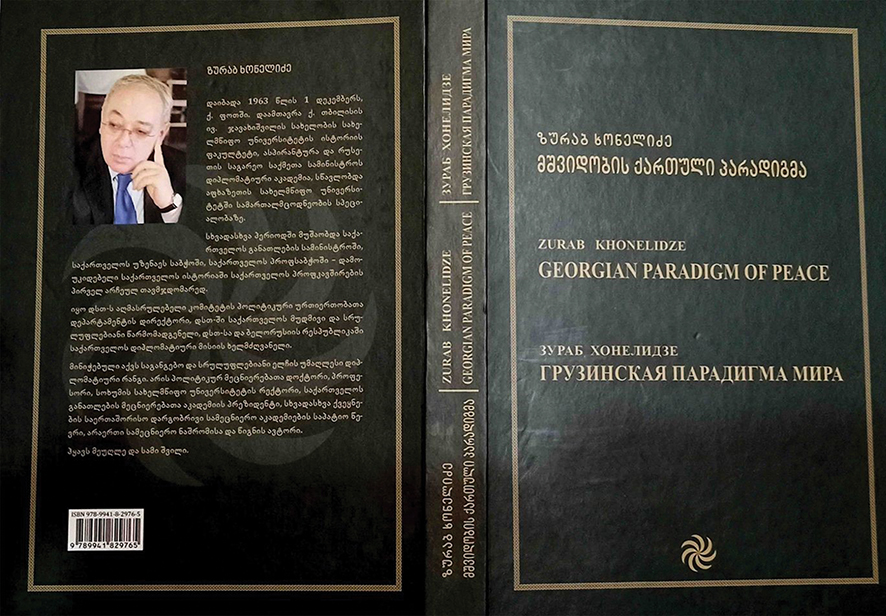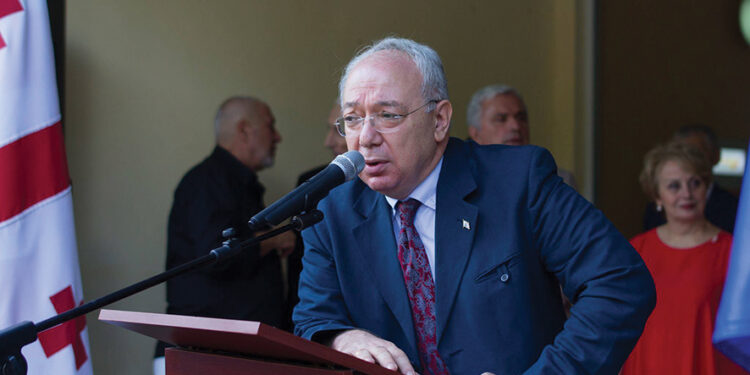One of the world’s most celebrated intellectuals, Jeffrey Sachs, maintains that through joint efforts, Georgia, Azerbaijan, and Armenia could function more effectively on the international stage than they might if acting independently. He emphasizes the importance of regional cooperation in the geopolitical space known as the South Caucasus. This significant statement by the renowned American economist, political analyst, and ecologist was recently made on Georgian television and was promptly reflected in the press, for our politically overcharged public to hear and appreciate.
Meanwhile, the rector of Sokhumi State University and president of the Georgian Academy of Pedagogical Sciences, Professor Zurab Khonelidze, has been nurturing this very idea for the past thirty-odd years. Yet he finds it difficult to garner as many adherents to it as the idea evidently deserves. His trilingual hardcover book is the result of extensive and strenuous work in the fields of political science and international relations. Ambitiously titled The Georgian Paradigm of Peace, the book has already been translated into twelve languages and is gradually attracting international attention. At the same time, the author has long been lecturing in various countries on the subject, masterfully elucidating the concepts in his truly thought-provoking and extremely topical piece on modern geopolitics.
The introductory words of the book are so striking that one is compelled to continue reading in search of the solutions it offers: “For Georgia, the thirty years of non-systemic dismantling of the Soviet system, and the nation’s state-building course, have turned out to be full of contradictions. At the outset of the post-Soviet space transformation, we, like several other countries, were betrayed by our political intuition, having not been able to escape the ‘mines’ planted by the empire, especially the imposed ethno-political conflicts, whose tragic consequences still affect the Georgian state and society.”
Sakartvelo’s geopolitical, social, and economic problems were not accumulated overnight. They have always existed and continue to compel the Georgian people and their various leaders to turn the wheel of history in a direction that will presumably give the nation its long-deserved chance at a better life. The current status quo of the country’s impaired territorial integrity cannot—and should not—be tolerated by this nation. The author is doing his utmost to find a cure for Georgia’s temporary division, its political maladies, and moral distress, thereby reinstating its organic unity.
Sokhumi State University is represented in the United States by the prominent Georgian international relations analyst Lasha Kasradze, whose academic background is in international relations and security studies, holding an MA from the Fletcher School of Law and Diplomacy at Tufts University. Kasradze has thoughtfully endorsed The Georgian Paradigm of Peace by Zurab Khonelidze. A couple of months ago, thanks to Lasha’s personal efforts, Professor Jeffrey Sachs’s valuable comments were brought to the attention of Georgian TV viewers. I am more than certain that expert Lasha Kasradze had a deep, preliminary conversation with Jeff Sachs about Georgia and Professor Khonelidze, who firmly believes that the three South Caucasian nations should combine their social, political, and economic efforts to achieve their most valuable and elevated national goals, especially on the international stage.

What a happy coincidence! Both professors—American and Georgian—happen to be on exactly the same page when it comes to major geopolitical philosophy and decision-making.
With that formula strongly in mind, Professor Khonelidze believes that the Georgian people and their political leaders should not dramatize the current situation in the country. It is not the reality around us that kills the joy, he argues, but rather our attitude toward that reality. Instead, they must believe that “where there is a will, there is a way.” The solution, he continues, lies within us: in our way of thinking, in a novel reconsideration of Sakartvelo’s role in the international arena, and in its additional functionality among the nations of the world.
The book includes a sizable segment titled University Diplomacy, which begins with the history of the Georgian educational tradition and diplomatic heritage. It then introduces university diplomacy as a new form of international relations and a new kind of diplomacy, concluding with a chapter entitled Let’s Learn Peace. Indeed, Sakartvelo has learned how to make peace with the rest of the world and how to allow its good people to live in lasting peace. Professor Zurab Khonelidze’s book may well serve as a real manual on how to preserve that peace—and make it even more enduring.
Blog by Nugzar B. Ruhadze














